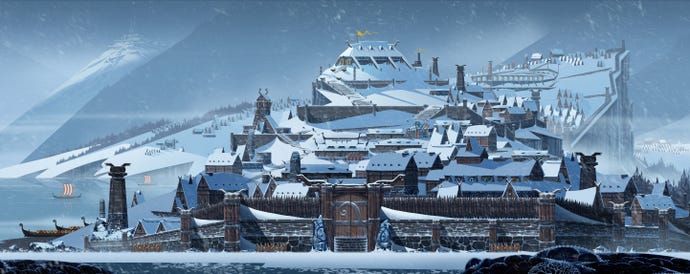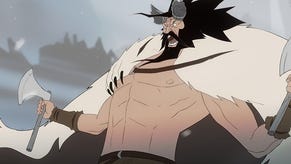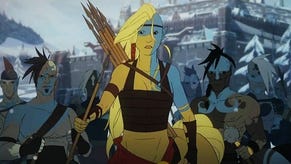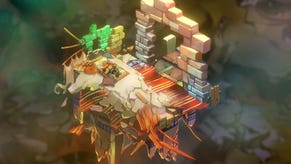The Banner Saga PC Review: Game of Thrones Meets Vikings Meets Disney
Stoic Studios' tactical RPG The Banner Saga proves that it's definitely more than just a ridiculously pretty face.
This article first appeared on USgamer, a partner publication of VG247. Some content, such as this article, has been migrated to VG247 for posterity after USgamer's closure - but it has not been edited or further vetted by the VG247 team.
Cassandra Khaw, Primary Reviewer
I feel sick.
Someone is dead and it's my fault. He called my bluff, a bluff I never should have made. I was too confident in youth's cowardice to believe the worst would ever come to pass. He'd break. He'd listen to me. He'd come around. I was certain of it. But as the bodies begin to fall, crushed under a tide of obsidian, the gravity of my miscalculations dawned. This ... this wasn't how it was supposed to be.
Too late, I tried to make up for misdeeds by pitching my exhausted army after him and his men. We fought desperately to reach them. Let no one tell you otherwise. But it was pointless. He died in the end as did far too many of my men. So many needless casualties, so much waste -- all because I refused to take one young man's swagger as genuine strength. This is all my fault and I feel sick, sick, sick.
Under the intricate, 60's Disney artwork, Stoic Studio's inaugural offering is a Viking myth, steeped in blood and darkness and ice. People die here, often with terrifying abruptness. In a previous playthrough, a young shieldbearer's head was caved in because of a moment's hesitation. In another, a loyal friend died when I chose the company's interests over his. Unlike so many other games, The Banner Saga does not confer the security of narrative. No one in this beautiful, tactical role-playing game seem immune to the Reaper's attention.
And it's glorious.
Because of the constant looming threat, every action you take feels weighted with consequence. Will this seemingly innocuous banter lead to deeper repercussions? Are these new refugees, salved from a dredge attack, going to be the reason the convoy dies or will they be instrumental in its survival? To be fair, erronenous decisions are not necessarily permanent. This is not a roguelike, after all. However, reloading from a checkpoint will cost you substantial amounts of progress and dilute the intent of the developers. According to virtually everything they've ever said ever, Stoic Studios have always wanted players to take each failure in stride, to regard The Banner Saga as they would real life -- without rollbacks and do-agains.
But look at me. I've been talking about this game for ages without presenting any semblance of the nitty-gritty. What is The Banner Saga and why should you care? Made by a team of ex-Bioware folk, The Banner Saga is a story-driven, low-fantasy tactical RPG polygamously married to a visual novel and The Oregon Trail. It charts the tribulations of two groups: one led by a horned giant named Hakon and the other by the human hunter Rook. There's no ostensible connection between the two, outside the fact that both parties are bound on long, dangerous journeys under a sun that will not set.
One of the things that set The Banner Saga apart from so many RPGs is that there's no sense that any of the characters are of world-shaping importance. Neither Hakon nor Rook are framed as messiahs. They're just varl and men, both of which seem more arguably vulnerable than the rest of the cast due to the responsibilities imposed on them. And while these two are the fulcrum on which much of their storylines rest, the supporting cast is no less interesting. The Banner Saga's minimalist approach to exposition serves it well here.
We're not told much of a flaxen-haired raidmaster's history but his blushing concern over a certain girl hints at more. The rotund, elderly varl who serves as narrator and historian? He may have been a war hero, if the passing comments from the younger varl are any indication of things. Similarly, most of the world building is comprised of passing mentions and off-handed allusions which is a surprisingly effective method of storytelling. Why did the sun stop spinning? What are the dredge? What are the varls? The Banner Saga is not telling. (Yet?)
The bones of the game are no less enduring. Combat here is solid and perennially tense. Again, The Banner Saga breaks the mold by limiting your opportunity to grind for levels. Unless you take hazardous risks, chances are you'll stumble into each new encounter with considerable trepidation.
It might not immediately seem that way, however. At first blush, the battle system looks uncannily simple. Every character can choose to attack, rest, move across the battlefield or utilize their one special ability. Willpower is also a factor, of course. If the unit in question has sufficient grit, they'll be able to increase their range of motion and attack potency by a smidgeon. Nothing immediately interesting.
But then you break it down and it starts to get intriguing. Take Strength, for example. The stat functions as both a barometer of character's health and an indicator of how hard they hit. So, when characters take damage, their Strength will invariably diminish, up till the point they're only capable of wanly batting at their opponents. As a result, one of the most effective ways to deal with combat is to treat it the way you would in real life -- by keeping those capable of sustaining such blows in the foreground, rather than allowing your hard-hitters to be punished.
There's positioning to consider as well. Certain characters either endow or receive buffs depending where they're located in the battlefield, making it sometimes necessary to keep them out of the fray so that the rest of your squad can benefit from their presence. And armor? Also of import. Armor helps mitigate damage dealt to a character's strength. You can also specifically choose to level up a unit's ability to break armor, a freedom which can, I assure you, be absolutely essential to success.
Less exciting (though arguably just as impactful) is The Banner Saga's take on The Oregon Trail. Much of your time in the game is spent on the road, caretaker of a few hundred lives. It is your responsibility to ensure that they're fed, that morale is sufficient, that you make the right decisions on their behalf. Along the way, your ability to contend with the last will be frequently called to question as The Banner Saga throws scenario after scenario at you. In spite of the fact these decisive crossroads are essentially multiple-choice answers, they feel meaningful. Rarely are you given any indication of what might have transpired if you had selected a different route and you are never, ever forewarned of what the outcome of even the simplest remark might be.
I ... just go and play it, will you? With the caveat that you understand that this is only tangentially related to games like Final Fantasy Tactics and Fire Emblem. You won't be able to assemble a League of Extraordinary Fantasy Soldiers here or even dress them to the nines. Which is fantastic because the claustrophobic desperation of the plot wouldn't gel well with the genre's usual tropes. The Banner Saga is a taciturn beast, unwilling to freely yield its secrets. It's like the winter that swallowed the world, with rules that are blindingly simple to understand but difficult to command. Beautiful, bleak and built like what all good viking-related media want to grow up to be, the first chapter of The Banner Saga is a work of art. (So there, hah!)
The Nitty Gritty
- Visuals:You've seen the screenshots, right? And the videos? If not, I invite you to scroll back upwards and lavish in all that hand-drawn magnificence. The Banner Saga is, hands down, one of the prettiest I've seen in recent history. You'd think that Stoic would take every opportunity to showcase precisely how masterful their art team might be but they don't. The jaw-dropping graphics, which are evocative of 60s' Disney animations, are deployed with the precision of a brain surgeon. There's an attention to detail that makes me want to sit and drink in every frame. Embroideries are never just squiggles on the cloth, they're meticulously written into the fabric. Rings are obviously but understatedly ornate, horns embossed with the passage of a varl's years. (Bonus points: Stoic Studios didn't go for the low-hanging fruit by adding buxom Viking barmaids. The women? Happily realistic-looking. Kudos, fellas.)
- Music and Sound:A fun fact: I ordinarily play with games muted. I don't know why. I just do. Call it habit. I used to own a laptop with a busted sound card for the longest time. Yet, The Banner Saga's soundtrack had me so smitten I kept the game on for background music even when I wasn't actively playing it. What's most fascinating about it is the simple fact that there is so little of it to speak of. Long periods of silence, broken only by the clang of metal or the howl of the blizzard, alternate with the swell of wind instruments. Like the graphics, the fully orchestral score, heavy with intent, is gorgeous but not overwrought.
- Interface:There's not really much to be said here outside of the fact that The Banner Saga plays out pretty much exactly you'd think something like this would: with the mouse functioning as your bridge to the world. Almost all of the sparse interface will be instantly familiar to anyone who has spent any amount of time with a video game. The only exception is the sometimes infuriating inability to change camera angles during battle.
- Lasting Appeal:Is there any form of replayability in The Banner Saga? Short answer: it depends. Long answer: how much do you want to know about what would have transpired had you made different choices during your play throughs?
Mike Williams, Secondary Reviewer
Banner Saga is an interesting beast and I say that because my expectations when I picked up the game were wildly different from the final product. I'm a big tactics strategy fan, so when I looked up Banner Saga for the first time a few days ago, I was pretty excited. Tactics games don't always work out for me, but I'm always willing to trying them out. I didn't read deeply into the game's description because I wanted to go in fresh.
Banner Saga isn't quite a tactics game, despite some of the screenshots you may have seen.
It has a very strong strategy game system with some interesting ideas. Your characters' strength represents their life and their ability to attack. Willpower, a limited use stat, allows you to push attacks and movement a bit farther if you so desire. Armor staves off attacks, and you can choose to attack your enemies' armor or strength. The core of the Banner Saga's tactical strategy engine is pretty strong, but again the game's focus isn't quite the tactics part. (Some reading points me at the free-to-play Banner Saga: Factions as the place to get a heartier dose of strategy action.)
Banner Saga is an animated storybook with player choice at the forefront, that also happens to have a very good tactical strategy game.
The best comparison I can give you is Telltale's games. They are animated stories that also have quick-time events to increase player urgency and create tension. Banner Saga's strategy sequences feel like those QTEs: solid bits in-between the fable being told. Those bits could use a bit more fleshing out and player options, but that's probably my Disgaea/Final Fantasy Tactics love talking. I tend to want the ability to shift classes and really tailor my party to my strengths. In Banner Saga, the story generally dictates the party you'll have at your disposal. It becomes sort of a strategy puzzle to use that party to win.
So how's the story? It's pretty decent if a bit disjointed early on: like any sprawling fantasy tale you're not confined to a single character or party. Sometimes within a certain group the character who's point of view you're experiencing will change. If you're not paying attention you can get lost. People die, people leave; your choices in the game affect how that happens.
I admit part of me has adjusted to story-based titles having fully voiced conversations and cutscenes, something that's not present here. The developer, Stoic, Kickstarted this game and choices had to be made as to where the money would be spent. They chose to focus on that solid gameplay, some writing, and an absolutely amazing visual presentation. I can't fault them for that because Banner Saga is a looker. Human and varl alike look great up close and each character is completely distinct. There's little animation touches in the combat sequences that are a sight to behold. The background art is simply amazing. The art and story combined to make Banner Saga a game that doesn't look quite like anything else out there.
Is Banner Saga enough to dethrone my current Tactics darling, Fire Emblem: Awakening? No, but it's a good game. The team at Stoic Studio has put together a worthwhile start for their episodic tale with this first Banner Saga release. Hopefully, the reception is good enough that they can finish the tale. I'll be waiting.
ConclusionThe Banner Saga is blindingly lovely and arguably just as intriguing to play. Built atop a world that all but demands the attention of travel documentaries, it's epic in the literal sense of the word. Love, family, duty, responsibilities, social dynamics and even a quiet nod towards feminism are present in abundance. The writing is terse but lush with wonder. Characters, while not universally likeable, are substantial enough personalities to merit anguish if you lose them. If you're willing to contend with the fact that such deaths might occasionally seem arbitrary and enjoy rather hard games, The Banner Saga should claim a spot on your backlog.











